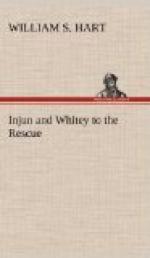In that part of the country there was a rather eccentric character named Charlie Clark. He had been creased on the head by a bullet sometime, somehow, and he was not exactly all there. And Injun and Whitey used to interpret the calls of the prairie chicks to:
“Char-lie—Clar-k—Char-lie—Clar-k—Char-lie—Clar-k—” for the hens, and:
“Darn’d ol-fool—” for the males.
And so the boys went on their merry, heedless way. They expected to camp in the foothills that night, and had made about ten miles in a leisurely way, when Injun happened to look back and saw an object approaching them in an uncertain and wobbly but determined manner. Injun’s sharp eyes soon identified it as Sitting Bull. The boys were first surprised, then sorry that Bull should have had such a long pursuit, but that did not keep back Whitey’s laughter when Bull staggered up to where they waited for him. He sure was a happy dog, and fatigue did not keep him from showing it, his method being to twist his body into almost a half-circle, wag his stump tail, and prance about gazing delightedly up at the boys.
As a hunting companion he was a frost. Looking at it in that light, and after deep consideration, Injun spoke. “Him must go back,” he said.
“How?” asked Whitey.
More profound thought, and Injun spoke again. “Me take him,” he decided.
“Oh,” said Whitey, “and I wait up in the mountains alone. Perhaps you wouldn’t mind sending me daily or hourly reports of Bull’s condition while he is recovering from the fatigue of his journey.” Injun didn’t know whether this was sarcasm, or if he was being kidded, and he didn’t care. His was a serious mind that was not easily turned to light thoughts. “No,” said Whitey, “he goes with us, I can’t bear to disappoint him.” And perhaps Injun was better satisfied at this decision, though he did not express himself.
So the journey was resumed. For a time Whitey would carry Bull. When he tired, Injun would carry Bull awhile. When Injun tired, Bull would waddle a way. It was a strange way for a dog to go hunting.
As we are soon to part from Injun and Whitey, there is one more thing I feel that I should tell you about them. In a way I don’t like to tell it, in another way I feel that I ought to tell it and—anyway, I’m going to tell it and to call it:
CHAPTER XXIV
“IN MEMORY”
Up in the mountains, about two miles northwest of Moose Lake, was a hole which old Mother Nature had carelessly left there, and afterwards thoughtfully filled with water. The water was blue—probably in imitation of the near-by sky—so the place was called Blue Lake.
At Moose Lake there was a cabin and a canoe, as you may remember, and to Injun and Whitey that had seemed too civilized for a pioneer hunting trip. So they had fished the canoe out of the lake, and had made a portage with it. The canoe was light, and a boy could carry it over his head for quite a distance before he got tired or fell over a rock.




